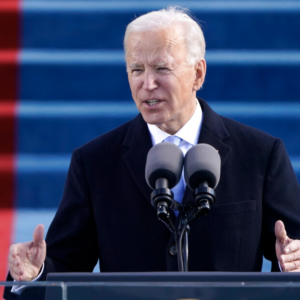Behind the pomp and parades of a presidential inauguration lie pure, political calculation. Barack Obama’s first inauguration was widely viewed as a political success, giving a boost to the early days of his presidency. Donald Trump’s dour “American Carnage” speech, greeted by massive protests in the streets of DC, was seen as a misstep.
So, how did Joe Biden do on his Inauguration Day? If veteran Democratic strategist Bob Shrum is a barometer, the new president didn’t just do well — he made history.
“It was incredibly moving, one of the great inaugural addresses of all time. It had so many grace notes. It really met the moment,” Shrum told InsideSources. “Not since JFK have I hard an inaugural address that was so extraordinary.”
Strong words from a consultant who’s worked on eight Democratic presidential campaigns, and who now serves as director of the USC Dornsife Center for the Political Future.
While other Democratic pros were’t quite as enthusiastic, the consensus is President Biden had a good first day on the job.
“Joe Biden set out to remind Americans of our shared values in the wake of many months of pain, suffering, and division — and his unique understanding of what it takes to emerge from personal crisis,” said Lynda Tran, founding partner at 270 Strategies in Washington, DC. “On all fronts, his speech rose to the challenge, combining his signature optimism with a realism about what we face today and what it will take from all Americans for us to come out the other side stronger than ever.”
Today, on this January day, my whole soul is in this:
Bringing America together.
Uniting our people.
And uniting our nation.
I ask every American to join me in this cause.
— From President Joe Biden’s Inaugural Address
Not surprisingly Republican strategists weren’t as effusive in their praise. While many concede that Biden spoke well, they have serious questions about how he’ll actually govern.
“Biden’s speech brought calm to a volatile moment,” said Alex Castellanos, who worked on the George W. Bush and Mitt Romney presidential campaigns. “It was a workmanlike speech that did what it needed to do, no more and no less. I expect that what he says throughout his presidency will sound like this. But what he actually does — won’t.”
Michael Biundo of RightVoter was a senior advisor on Trump’s 2016 campaign and he echoed Castellanos on Biden’s approach.
“President Biden set out to deliver a speech of unity, inclusion, and set a tone that is one of calm. I think for the most part he achieved that,” Biundo said. “The big test now is not what he said today but how he governs tomorrow and going forward. We have a very divided country and an evenly divided government. He needs to be the agent of healing if he is going to be successful.
“The jury is out on whether he’s up to that challenge,” Biundo said.
Biden followed up his inaugural address with a proclamation formally declaring Wednesday a “National Day of Unity” — the same declaration Congress made on September 12, 2001 in the aftermath of the 9/11 terrorist attacks.
Republicans note that while Biden’s rhetoric may be calming, some of his earliest proposals are filled with controversy. Proposing an amnesty plan for undocumented immigrants, putting a $15 minimum wage in a COVID relief plan and killing the Keystone XL pipeline are actions certain to provoke heated GOP opposition.
Still, if unity is Biden’s message, he’ll find a willing audience. A new Scott Rasmussen poll finds Americans want Washington to put unity ahead of party, too.
“Sixty-one percent of voters want President-elect Biden to build a larger governing majority with policies that can win over some Republicans and other Trump supporters,” according to Rasmussen. “Just 17 percent want him to ignore the concerns of his political opponents and try to implement as many Democratic policies as possible.
“Other than Very Liberal voters, a majority of every measured demographic group wanted the incoming president to build a larger governing majority by finding some common ground,” Rasmussen said.
Shrum believes Biden has the upper hand and his recommended strategy for Republicans is that they should get on board.
“Biden’s strategy is to use COVID-19 to create unity, bringing people together to fight the virus. He’s going to want more funds for distributing vaccines and more funds to help people in need.
“Republicans don’t want to get on the wrong side when it comes to getting COVID relief funds out to the American people,” Shrum said. “Just ask Senators Kelly Leffler and David Purdue.”
Republicans Leffler and Purdue were both defeated in the Georgia runoffs earlier this month.

